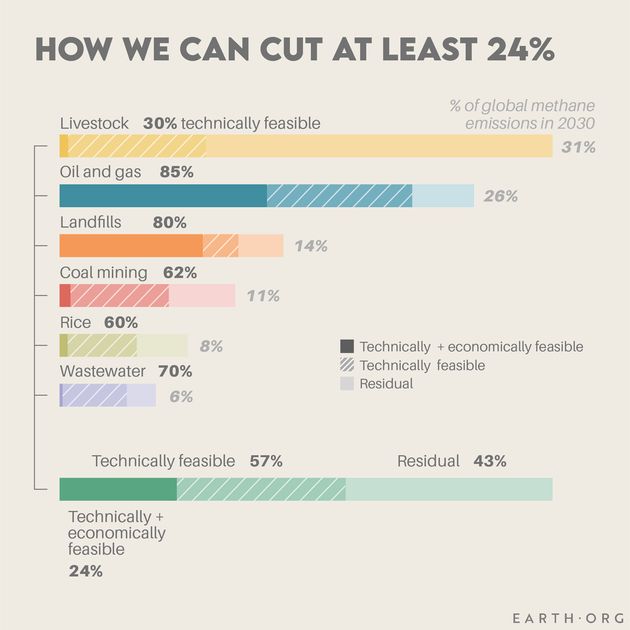Two-thirds of the global economy and half of the top 30 major methane emitting countries have joined the global methane pledge, which many call to be the most effective weapon against global warming in the short term.
—
What is Happening?
- Some of the world’s major methane emitters have joined a pact agreeing to cut methane emissions 30% by 2030.
- China, Russia and India, the top three methane emitters, are notably missing from the agreement.
- US to introduce new rules to reduce methane leaks and pollution in the oil and gas industry.
105 countries have signed a global methane pledge agreeing to cut emissions by 30% from 2020 levels by the end of this decade, but the largest methane emitters including China, Russia and India remain outside the deal.
The global methane pledge, spearheaded by the EU and the US, was first introduced in September with only six members supporting. Now more than 100 countries have committed to reduce their methane pollution and emissions from the energy, agriculture and waste sectors as a key effort to slow down global warming.
Methane is a greenhouse gas that has 80 times the warming potential compared to carbon dioxide – the biggest contributor to global warming – over a 20 year period, and drops to 28-34 times over a century. Methane emissions largely comes from sources such as livestock, oil and gas industries, landfills, and coal mining. The global pledge to reduce 30% of methane emissions is estimated to curb global warming by at least 0.2C by 2050, meaning methane reductions can yield near-immediate results unlike carbon reduction.

Three of the world’s biggest contributors of methane pollution remain notably missing from the pact. In 2018, China emitted more than 1,200 megatonnes of methane gas into the atmosphere, while Russia and India contributed over 800 and 600 megatonnes respectively.
Some of the latest nations joining the pact include Brazil, a major methane emitter that was recorded to contribute over 400 megatonnes of methane in 2018.
US President Joe Biden has not only agreed to the global pledge, which he helped officially launched at the COP26 climate conference in Glasgow, but will also be launching new initiatives and rules domestically to help reduce methane pollution from the oil and gas industry. The Environment Protection Agency (EPA) will be regulating leak detection and repair in both new and existing infrastructure, including the regulation of natural gas produced as a by-product of oil production that is vented or flared.
“This isn’t just something we have to do to protect the environment or our future,” said Biden, adding these new rules offer an opportunity for “all of our nations to create jobs and make meeting climate goals a core part of our global economic recovery as well.”
Unlike Biden’s infrastructure bill that provides more than $555bn worth of funding to tackle climate change, which was hamstrung by centrist Democratic Senator Joe Manchin, the proposed regulatory measures do not require Congressional approval, allowing Biden to make short-term and potentially highly-effective greenhouse gas reductions.
You might also like: Why Limiting Methane Emissions Should be our Main Concern


















